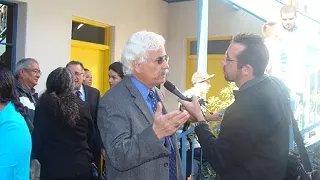Just a few hours before outgoing Superintendent of Public Instruction Tom Horne was sworn in as Arizona's new attorney general on Monday, Jan. 3, he announced at a press conference that Tucson Unified School District is in noncompliance of the anti-ethnic-studies law that he helped create, according to a 10-page report that he compiled.
Save Ethnic Studies—a group representing 11 Tucson educators who filed a lawsuit last year against Horne and the Arizona State Board of Education—held their own press conference, making it clear that they feel Horne's HB 2281 is illegal and unconstitutional.
Tucson attorney Richard Martinez, who represents the 11 TUSD teachers, said one problem with Horne's 10-page report is that it relies on evidence from anonymous complaints and witnesses.
"I think what we have here is a finding that reflects a personal agenda," Martinez said.
The anonymous sources in Horne's report will have to be identified in order to be used in court proceedings, Martinez said. He also claimed that Horne's report and press conference furthers a conflict of interest for the new attorney general, as he'll be tasked with defending the law in his new position.
"He's compromised his office," Martinez said.
HB 2281, which became law on Dec. 31, is part of a four-year crusade that Horne began after labor activist Dolores Huerta visited Tucson High School and, during a speech, made a comment in reference to state legislation that Republicans hate Latinos.
On a Tucson radio talk show the morning of Horne's press conference, Horne said that when he learned about Huerta's statement, he sent Deputy State Superintendent Margaret Garcia Dugan to address Tucson High Magnet School students and tell them: "I'm a proud Latina (and a) proud Republican, and I don't hate myself."
During Horne's press conference, he continued to stand by his findings that the TUSD's Mexican-American studies classes divide students by race. He claimed his fight against the program was a fight for civil rights.
"It is fundamentally wrong to divide students up according to their racial groups, and teach them separately," Horne wrote in his report.
While the classes may have started off as a way for the district to address disparities that Latino students were suffering regarding academic achievement and dropout rates, the classes have always been open to all TUSD students.
Horne said TUSD has 60 days to comply with the law by getting rid of its Mexican-American studies program. If the district refuses, he said, the law allows 10 percent of the school's state funding to be withheld, which is approximately $15 million.
"I've never seen a district faced with a substantial loss of funds not come into compliance with state law, and I believe that if this school board were to try to have this school district suffer a 10 percent cut in their budget in order to defy state law, the school board members would be immediately recalled by the parents who would not put up with something like that," Horne said.
Horne also claimed critics of the Mexican-American studies program are being intimidated, and it's his job to make sure those critics—as well as the district—are not intimidated.
"Now, the technique is that if someone disagrees with you, they call you a racist in order to stop the discussion," he said.
The new superintendent of public instruction, John Huppenthal, has said publicly that he "would stop La Raza." While running for attorney general, Horne said he was prepared to provide all of the legal help the new superintendent would need to bring down Mexican-American studies at TUSD.
During the press conference, Horne reiterated that he is prepared to help Huppenthal and the Department of Education if Huppenthal decides to withdraw funding and take on a legal battle.
TUSD school board member Adelita Grijalva was at the Save Ethnic Studies press conference, along with other elected officials, including Tucson City Council members Karin Uhlich and Regina Romero. Grijalva said the TUSD school board has already voted three times in support of the Mexican-American studies program—as recently as the last week of December, when the board determined that the controversial program is actually in compliance with the new law.
Grijalva said that if funding is taken away in 60 days, TUSD will go before the state Office of Administrative Hearings to appeal the decision.
"But right now, we are also asking the Department of Education to clarify for us what (Horne's) decision is based on," she said.
If nothing is resolved, Grijalva said the district is prepared to fight for the program in court.








